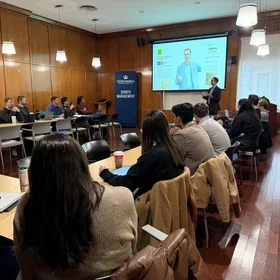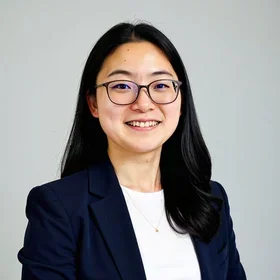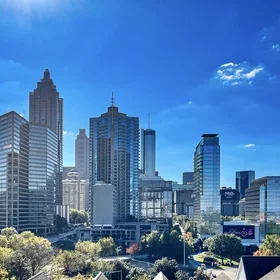As Peter Lichtenthal prepares to complete the Ecology, Evolution, and Environmental Biology Certificate program (E3B) at SPS, he is committed to continuing the pursuit of his passion for conservation in the academic world—this time, through a highly specialized master’s program in environmental conservation.
We sat down with Peter to learn about his background, journey with the certificate program, favorite courses and professors, and how the experience helped him realize what the next stage in his career in conservation should be.
What were you doing before you started the E3B program?
I went to undergrad in New York City for theater acting. I had grown up loving nature and being fascinated by wildlife, but I never pursued it as a scientific endeavor because I was intimidated by it. But halfway through my undergraduate program, I ended up going on a volunteer conservation trip to South Africa and it was a very transformative experience for me. Fortunately, following my graduation, I received an internship at GVI—a company that works globally in biodiversity hotspots—and worked in Costa Rica’s Tortuguero National Park for six months as a researcher in sea turtle nesting and rainforest biodiversity.
My biggest regret at that time was that everybody I worked with had solid scientific schooling in the field; I felt like I was learning a lot more than everyone else through their academic background, but that my own contributions came up short due to my inexperience. So it was a bit more of a sprint than a marathon to get to their level. Coming back to the city, I knew I needed to pursue conservation sciences as a career, while still honoring my creative background.
How did you initially find the E3B program at Columbia? What about it appealed to you?
I knew I wanted to stay in the city, but it was also disconcerting to think of entering a conservation program in the most urban setting I could think of. I've always been a Massachusetts boy at heart—I grew up in the suburbs, near woods. When I found the E3B program, I was nervous about the fact that it was at Columbia, but I thought that just based on my experiences and passion for what I wanted to do, I had a clear idea of where I wanted to be. Right off the bat, the E3B program offered exactly what I wanted. I didn't have a college education in chemistry, in biology, in climate; all of those were required in the program. They were subjects that I found very daunting and difficult, but the classes ended up being extremely rewarding in helping me flesh out what I wanted to do.
Tell us a little more about your studies.
I started the program in the summer of 2018, when classes were in-person. I was working part-time pretty heavily and I wasn't able to take many classes when I started. My first class was with Professor Leo Douglas, an adjunct, and his specialty was working in conservation marketing. I'm in my last course now, which is an elective course—ornithology. I'm a big bird lover, so I'm very happy to be in that class. I'm actually applying for the E3B master's program as we speak.
I felt like I was getting a leg up over other biology courses in the sense that I was getting an in-depth look at the things that I was interested in and the things that employers would expect me to know."
How has the certificate program helped you decide to pursue a full master's degree?
I started the certificate program thinking that I would get it and then immediately look for jobs, which has been helpful in getting me a lab position at the Zuckerman Institute. It’s with Andrès Bendesky, who's one of the biology professors and works directly with the E3B program. I work in animal behavior, and I'm hoping I can do some work in gene editing with CRISPR.
But more than that, after taking the breadth of classes in the certificate program, it made me realize how much I wanted to continue my education. I remember going to my advisor in my first year and asking, “How can I finish school and get a job?” And now I am going to him asking, “Let's talk about my application. Let's talk about my master's thesis.”
What has been your favorite course?
I took a conservation biology course last semester with Alex Moore. It was phenomenal. Taking a class that was more discussion-based with passionate classmates and an incredibly passionate professor was a great experience. I was so happy to know that there's a specific environmental biology course in the program, as opposed to general biology courses that cover cellular structures and other starting points. But through the program, I had the opportunity to go deeper into organism biology, learn the history of biodiversity, genetics, evolution. So I felt like I was getting a leg up over other biology courses in the sense that I was getting an in-depth look at the things that I was interested in and the things that employers would expect me to know.
How do the courses introduce the larger world of conservation to the classroom in an urban setting?
With the ornithology class, ideally what they would be doing is having birding meetups in Central Park, Prospect Park, or parts of Brooklyn and the Bronx. Because of COVID, we haven’t been able to do that. We do have access to the Earth Institute, however; we had a field trip there for my climate class, which was excellent. Just the site alone has so much history behind it. It was really nice being there and seeing their labs, being able to physically see all the tools and the material that they have, and observe how climate science has evolved over the years. Obviously, a lot of the professors work in the museum, do field research either in city parks or upstate. It's not that hard to see the connection between the natural world and the city, once you meet these people who are actively engaged in climate and biodiversity work.
What would you ideally be doing once you come to the end of this road?
I am still in the process of figuring it out, but I think my biggest hope or dream is really just to make an impression on the world that animals have a right and a reason to be protected, that they're not just a luxury that we can take advantage of. In fact, they provide an incalculable number of biological services. They're unique in their individuality. They have not only a scientific right but also an ethical right to be here. I've always said to myself, “The more you know about it, the more convincing you can be.” I just hope that I can create at least my own bubble of society that believes in what I believe in.
What advice would you offer to any other students who might be interested in the E3B program?
My best advice is: don't be intimidated by your professors. Don't get imposter syndrome. I think what's easiest to do is remember that a lot of people feel the same jitters and nervousness that you do, especially in the early classes. It's very intimidating when you're going into a degree that you have no familiarity with, especially if you're doing it at a competitive level with other people that might have more experience than you. But there are so many people in the school, different people with different experiences, so you're not going to be outclassed as much as you may think you would.
Learn more about the Ecology, Evolution, and Environmental Biology Certificate program at SPS.


